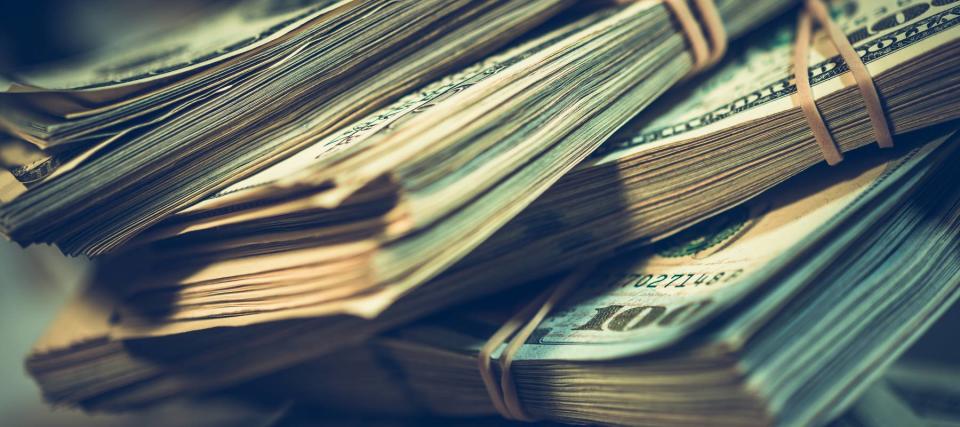I lost faith in banks in 2009 — now I have $650K in cash sitting in a safe. Can I deposit this money legally?

Anyone who lived through the Great Recession remembers the tremendous economic turmoil that took place.
Banks had made mortgage loans to unqualified borrowers, bundling those loans into mortgage-backed securities that were sold to investors. The entire house of cards collapsed as home prices began to fall and interest rates began to rise. Several major banks failed, the government was forced to bail out more and the stock market plummeted.
Don't miss
Car insurance premiums in America are through the roof — and only getting worse. But 5 minutes could have you paying as little as $29/month
Commercial real estate has beaten the stock market for 25 years — but only the super rich could buy in. Here's how even ordinary investors can become the landlord of Walmart, Whole Foods or Kroger
These 5 magic money moves will boost you up America's net worth ladder in 2024 — and you can complete each step within minutes. Here's how
While the economy eventually recovered, many people became wary of financial institutions — with some people worried enough to withdraw their funds from banks and brokerage firms entirely.
If you're one of those people and have been hoarding cash since the Great Recession, you've sadly missed out on the chance to benefit from years of economic growth. While the average closing price for the Dow Jones Industrial Average was around $8,886 in 2009, the average in 2023 was $34,122, and has continued to rise in 2024.
For those who want to get in on the gains, it may be time to make a change. However, you'll need to understand the rules for doing so.
How to deposit a large sum of money
If you've amassed a large sum of money at home instead of putting cash in the bank, you may be wondering if it's even possible to deposit it once you've had a change of heart.
The answer is yes, but there are some caveats.
Specifically, when you deposit over $10,000, your bank is required by the Bank Secrecy Act to report it to the Financial Crimes Enforcement Network. Your bank may ask some personal questions, including why you're depositing such a large sum, so you must be prepared to answer them.
To be clear, if you've done nothing wrong, earned the money legitimately and paid taxes on it, this reporting requirement shouldn't worry you. You just need to know about it so you aren't caught off-guard by the bank's queries.
Read more: Rich, young Americans are ditching the stormy stock market — here are the alternative assets they're banking on instead
What you don't want to do, though, is break up your big deposit into a series of smaller ones to evade reporting rules. This is called “structuring” and it's illegal even if you earned the money legitimately.
It’s also a good idea to call the bank in advance of making a large deposit. Showing up with $650,000 in cash could cause problems if the financial institution isn't prepared to handle that much all at once. Your bank can work with you to find a safe way to deposit the money.
You should also be aware that the Federal Deposit Insurance Corporation only insures up to $250,000 per person, per account, so simply depositing $650,000 into a bank account may not be the best move. You may want to put some money into different savings accounts or buy Certificates of Deposit or other investments with it so you don't risk losing funds above $250,000 if another bank collapse happens sometime in the future.
Making moves
While banks gave consumers lots of reasons to distrust them in the leadup to the Great Recession, the reality is that over-reacting and opting out of the financial system isn't necessarily the right move.
In fact, if you had money in index funds at the time, you may have been able to recoup your losses and earn much more. For example, if you'd had $100,000 in an S&P 500 index fund in 2009, that money would be worth around $850,000 in 2024 if you reinvested all your dividends.
Recoveries happen, as well as recessions. Many experts believe the single-best way to grow your wealth is to invest steadily over the long-term. Investing legend Warren Buffett even recommends average investors put their money in an S&P 500 index fund, since the index has a multi-decade track record of success. By not participating, you may be limiting your earning potential.
What to read next
Cost-of-living in America is still out of control — use these 3 'real assets' to protect your wealth today, no matter what the US Fed does or says
Lock in juicy quarterly income through this $1B private real estate fund — even if you’re not a millionaire. Here’s how to get started with as little as $10
Jeff Bezos and Oprah Winfrey invest in this asset to keep their wealth safe — you may want to do the same in 2024
This article provides information only and should not be construed as advice. It is provided without warranty of any kind.